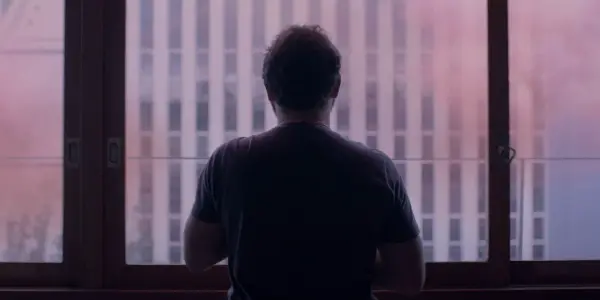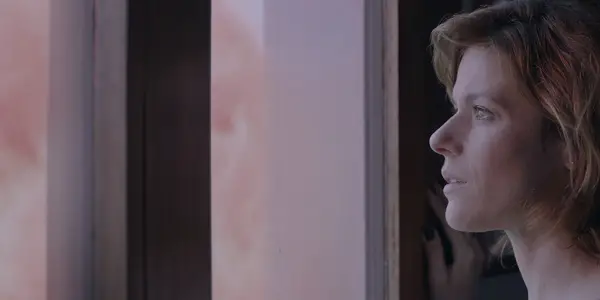THE PINK CLOUD: An Arresting & Unfeigned Pandemic Drama

Andrew Stover is a film critic/writer from the Chicagoland. His…
Unlike other films that were were written and shot during the pandemic — including but not limited to Doug Liman’s Locked Down, Stephen Daldry’s Together, and Rob Savage’s Host — Iuli Gerbase’s Brazilian feature debut, which showcases a global catastrophe that leads to a global quarantine, was filmed before there was any whiff of COVID. That’s a fact made all the more clearer by an opening inscription that reads: “Any resemblance to actual events is purely coincidental.”
Despite being made before a real-life pandemic hit, Gerbase’s The Pink Cloud seamlessly encapsulates the fairly grim, isolated reality of quarantine life. Being quarantined for a long period of time forces some people to re-evaluate their relationships and aspirations. Some struggle physically while others struggle mentally. But what would quarantine look like when you’re stuck with a stranger you had a one-night stand with. That’s the scenario Gerbase builds off from as cryptic and deadly pink clouds consume the world, thus confining two strangers inside a house.
Visually & Thematically Rich
Website designer Giovana (Renata de Lelis) and chiropractor Yago (Eduardo Mendonca) have just met. They spend the night together, unaware that come next morning, the world will go into mandatory lockdown after a slew of pink clouds surface all around the world. If a human interacts with a pink cloud, they will die within seconds. However, as long as humans remain behind doors, the pink clouds can’t get in. The origin of the pink, ubiquitous substance, as well as the fundamentals of it, are never established. But those details aren’t as important as the human experience, especially when that experience is rooted in a world-altering pandemic — which every viewer can connect with to some extent because of the coronavirus. Anyway, the film centers on Giovana and Yago. The morning after they hook up, they receive alerts advising them to stay indoors because of deadly pink clouds. Initially, they don’t buy into it, but then moments later the siren goes off, which is an all-too-real indication that something is actually wrong.

Unable to return to the lives and people they knew, Giovana and Yago re-evaluate their current situation more than once as time passes by. They begin as platonic roommates and eventually become romantic partners who have disparate views on love and parenthood. As they grow closer over the years, they also grow apart since Giovana has more trouble adjusting to life in quarantine. She turns to virtual reality to find bliss elsewhere outside the walls. Yago is more willing to go along with the life they built inside. Years go by without any change. Giovana and Yago undergo the highs and lows of a typical relationship. Yet, Gerbase takes a more understated approach in conveying the couple’s escalating tension.
The Pink Cloud primarily follows two characters in a contemporary house. While noxious clouds are killing a large portion of the population, Gerbase never wavers from the couple’s perspective. Even so, cinematographer Bruno Polidoro applies the setting with light pink hues, despite the clouds not being able to infiltrate the house. This decision is likely meant to foreground the impending doom of the couple’s fate, but even that is uncertain because of Gerbase’s clever balance of hope and despair. One moment, it appears as if their complicated living situation is improving. Other times, it appears as if all hope is lost. Polidoro’s fluid camerawork and muzzy color schemes provide the film with a visually rich, ethereal radiance — and yet, the script deals with heavy, relatable topics of human connection, modern romance, and the pernicious effects of capitalism, rendering the film tonally and narratively somber.

Giovana is regularly seen talking to her sister on video chat, watching her grow from afar. Giovana and Yago look for romance on the internet without physical contact, which is more or less the catalysis of many modern relationships. And finally, there is a critique of capitalism going on in several scenes. For example, the cloud pandemic spurs a reality dating show. Still, there is a lack of depth and urgency to the commentary on account of the slower pacing and the couple’s limited perspective. Unlike other couples who may be lower on the social sphere or forced to do whatever they can to make ends meet, Giovana and Yago can stay afloat, with no clear financial hurdle that’s wholly known, let alone examined.
Stellar Performances
For a disaster film concerned about character development rather than spectacle, the characters must be well-defined and well-performed. Fortunately, Renata de Lelis and Eduardo Mendonca are fully equipped to fiercely, albeit subtly, exhibit their characters’ sporadic bursts of sadness and frustration. Even as their situation evolves and seems to be getting better, Giovana is never at ease in quarantine. Admittedly, Yago isn’t either, but he understands that he can’t control what happens with the clouds; he can only control how he decides to live his life in an unideal environment. Giovana is more vexed and disheartened by her new reality, assuming a more vociferously negative attitude. Yago is more composed and moderately optimistic. Yago keeps his frustration to himself — unlike Giovana, who slowly loses herself in a virtual reality and no longer finds enough comfort in his presence. Giovana’s character progression is extremely well-done by virtue of de Lelis’ powerfully dejected gaze that keeps one anticipating her mental descent.
Courtesy of Gerbase’s smartly-written screenplay, you can sympathize with the characters, even when they act abnormally. But, in all honesty, what is considered abnormal behavior when you are embroiled in a near-decade-long quarantine anyway? The Pink Cloud is the most dignified film to capture what lockdown life is like, and how much of a toll it can take on one’s mental health. Enlivened by the performances from Renata de Lelis and Eduardo Mendonca, The Pink Cloud is scarily precise and emotionally honest.
The Pink Cloud: Conclusion
While I’m sure many audiences don’t want entertainment that closely resembles real-life, there is something immensely impressive and laudable about Gerbase’s exploration of a relationship during a pandemic. Don’t get me wrong, the fact that The Pink Cloud preceded the COVID pandemic is startling in itself. But the way that human connection is portrayed intricately throughout is what makes this pre-COVID film stand out from all other films made amid the actual pandemic. Whether or not one finds enjoyment in The Pink Cloud, it’s hard to refute its timely and authentic depiction of a world and a relationship gone haywire.
Have you seen The Pink Cloud? If not, are you interested in seeing it now?
The Pink Cloud will be released in the U.S. on January 14, 2022.
Watch The Pink Cloud
Does content like this matter to you?
Become a Member and support film journalism. Unlock access to all of Film Inquiry`s great articles. Join a community of like-minded readers who are passionate about cinema - get access to our private members Network, give back to independent filmmakers, and more.
Andrew Stover is a film critic/writer from the Chicagoland. His film & TV reviews can be found on Film Inquiry & Film Threat.












